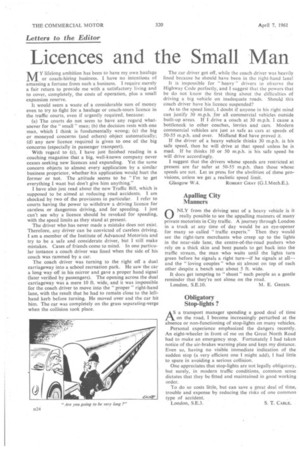Licences and the Small Man
Page 90

If you've noticed an error in this article please click here to report it so we can fix it.
MY lifelong ambition has been to have my own haulage or coach-hiring business. I have no intentions of amassing a fortune from such a business. I require merely a fair return to provide me with a satisfactory living and to cover, completely, the costs of operation, plus a small expansion reserve.
It would seem a waste of a considerable sum of money even to try to fight for a haulage or coach-tours licence in the traffic courts, even if urgently required, because; (a) The courts do not seem to have any regard whatsoever for the "small " man; (b) the decision rests with one man, which I think is fundamentally wrong; (c) the big or moneyed concerns (and others) object automatically; (d) any new licence required is given to one of the big concerns (especially in passenger transport).
With regard to (c), I have just finished reading in a coaching magazine that a big, well-known company never ceases seeking new licences and expanding. Yet the same concern objects to almost every application by a similar business proprietor, whether his application would hurt the former or not. The attitude seems to be " I'm to get everything I want but don't give him anything."
I have also just read about the new Traffic Bill, which is supposed to be aimed at reducing road accidents. I am shocked by two of the provisions in particular. I refer to courts having the power to withdraw a driving licence for careless or dangerous driving, and for speeding. I just can't see why a licence should be revoked for speeding, with the speed limits as they stand at present. The driver who has never made a mistake does not exist. Therefore, any driver can be convicted of careless driving. I am a member of the Institute of Advanced Motorists and try to be a safe and considerate driver, but I still make mistakes. Cases of friends come to mind. In one particular instance a coach driver was fined when the side of his coach was rammed by a car. The coach driver was turning to the right off a dual carriageway into a school recreation park. He saw the car a long way off in his mirror and gave a proper hand signal (later verified by passengers). The opening across the dual carriageway was a mere 10 ft. wide, and it was impossible for the coach driver to move into the " proper " right-hand lane, with the result that he had to remain close to the lefthand kerb before turning. He moved over and the car hit him. The car was completely on the grass separating-verge when the collision took place. The car driver got off, while the coach driver was heavily fined because he should have been in the right-hand Lane! It is impossible for " heavy " drivers to observe the Highway Code perfectly, and I suggest that the powers that be do not know the first thing about the difficulties of driving a big vehicle on inadequate roads. Should this coach driver have his licence suspended?
As to the speed limit, I doubt if anyone in his right mind can justify 30 m.p.h. for all commercial vehicles outside built-up areas. If I drive a coach at 30 m.p.h. I cause a bottleneck to other coaches, lorries and cars. Modern commercial vehicles are just as safe as cars at speeds of 50-55 m.p.h. and over. Midland Red have proved it.
If the driver of a heavy vehicle thinks 30 m.p.h. is his safe speed, then he will drive at that speed unless he is mad. If he thinks 10 or 50 m.p.h. is his safe speed he will drive accordingly. I suggest that the drivers whose speeds are restricted at present are far safer at 50-55 m.p.h. than those whose speeds are not. Let us press for the abolition of these provisions, unless we get a realistic speed limit.
Glasgow W.4. ROBERT GRAY (G.I.Mech.E.).
Apalling City Manners
0 NIA from the driving seat of a heavy vehicle is it really possible to see the appalling manners of many private motorists in City traffic. A journey through London in a truck at any time of day would be an eye-opener for many so called "traffic experts." Then they would see the right-turn merchants who creep up to the lights in the near-side lane, the centre-of-the-road pushers who rely on a thick skin and bent panels to get back into the traffic stream, the man who waits until the lights turn green before he signals a right turn—if he signals at all— and the "loving couples" who sit almost on top of each other despite a bench seat about 5 ft. wide.
It does get tempting to " shunt " such people as a gentle reminder that they're not alone on the road.
London, S.E.10. M. E. GREEN.
Obligatory Stop-lights ?
AS a transport manager spending a good deal of time on the road, I become increasingly perturbed at the absence or non-functioning of stop-lights on many vehicles. Personal experience emphasized the dangers recently. An eight-wheeler in front of me on the Great North Road had to make an emergency stop. Fortunately I had taken notice of the air-brakes warning plate and kept my distance. Even so, having no visible immediate indication of the sudden stop (a very efficient one I might add), I had little to spare in avoiding a serious collision.
One appreciates that stop-lights are not legally obligatory, but surely, in modern traffic conditions, common sense dictates that they be fitted and maintained in good working order.
To do so costs little, but can save a great deal of time, trouble and expense by reducing the risks of one common type of accident.
London, S.E.3. S. T. CABLE.




























































































































































